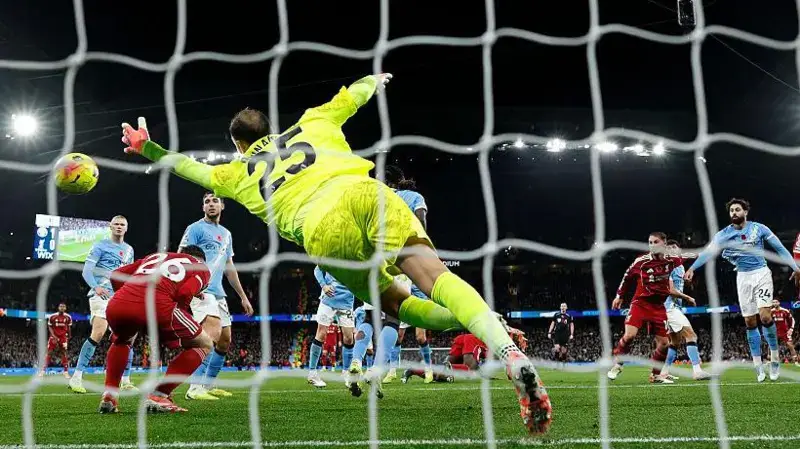
Premier League referees’ chief Howard Webb has publicly backed officials after Virgil van Dijk’s disallowed goal during Liverpool’s 3–0 defeat to Manchester City sparked controversy and frustration from fans and pundits.
The incident, which occurred in the 38th minute at the Etihad Stadium, saw Van Dijk’s headed effort ruled out for offside interference by teammate Andrew Robertson. The decision proved pivotal, with City going on to secure a commanding victory.
The Controversial Moment: Van Dijk’s Disallowed Goal
Liverpool thought they had equalised when Van Dijk found the back of the net from a corner. However, referee Chris Kavanagh and assistant Stuart Burt ruled that Robertson, who ducked under the flight of the ball in front of goalkeeper Gianluigi Donnarumma, had interfered with play from an offside position.
The Video Assistant Referee (VAR), Michael Oliver, reviewed the incident and upheld the on-field decision — a move that infuriated Liverpool and prompted the club to contact the Professional Game Match Officials Limited (PGMOL) the following day to seek clarification.
Howard Webb: “Not an Unreasonable Decision”
Speaking on the Match Officials: Mic’d Up show, Howard Webb, head of PGMOL, said that while opinions were divided, the officials’ decision was “not unreasonable” given the complexity and subjectivity of offside interference.
“Interfering with an opponent, where the offside player doesn’t play the ball, is one of the most subjective judgments in football,” Webb explained.
“As the corner came in, the City players pushed out, leaving Robertson in an offside position right in front of goal. When Van Dijk heads the ball, Robertson ducks under it just three yards out. The officials had to decide whether that action impacted Donnarumma’s ability to make a save.”
Webb said the on-field team concluded that Robertson’s movement did affect the goalkeeper’s reaction time.
“The player is very close to the keeper, and the ball passes directly over his head,” Webb added. “They formed the view that Robertson’s action interfered with Donnarumma’s attempt to dive for the ball. That’s a reasonable judgment under the laws.”
VAR’s Role and the “Clearly and Obviously Wrong” Standard
Webb clarified that VAR could only intervene if the on-field decision was “clearly and obviously wrong.” In this case, Oliver determined that there was sufficient evidence to support the assistant referee’s judgment.
“Only Donnarumma truly knows if he was impacted,” Webb said. “But based on the footage, Robertson’s position and ducking action so close to goal meant the offside decision was not clearly and obviously wrong. Therefore, VAR was right not to overturn it.”
Comparing the Incident to Manchester City’s Goal Last Season
Liverpool manager Arne Slot compared the decision to a Bernardo Silva goal against Wolves last season, which was initially ruled offside but later allowed following a VAR review.
Webb, however, dismissed the comparison.
“In that case, the ball went over goalkeeper Jose Sa’s head, not Bernardo Silva’s,” he explained. “Silva moved away from the ball’s path. Robertson, by contrast, ducked directly under it, right in front of the keeper. That’s the crucial difference.”
Beyond the Line of Vision: Understanding the Offside Law
Webb emphasized that offside interference isn’t solely about blocking a goalkeeper’s line of sight.
“The assistant referee mentioned line of vision, but other factors — such as proximity to the goalkeeper and a ducking motion — can also constitute interference,” Webb said.
“Even if the goalkeeper can see the ball, that kind of movement can cause hesitation. Goalkeepers rely on split-second reactions, so any distraction can be significant.”
Liverpool’s Frustration and the Ongoing Debate
Liverpool’s management reportedly contacted PGMOL on Monday to express their belief that the criteria for interference were not met. The club maintains that Robertson did not impede Donnarumma’s movement or vision and that the goal should have stood.
The controversy has reignited debates about VAR consistency, offside interpretation, and goalkeeper interference — all recurring flashpoints in the Premier League’s ongoing officiating scrutiny.
Still, Webb defended his officials, saying their interpretation was fair and consistent with how similar incidents are judged across competitions.
“There will always be differences of opinion, but our officials applied the law correctly,” he concluded. “It’s a subjective call, but it’s not an unreasonable one.”


Leave a Reply